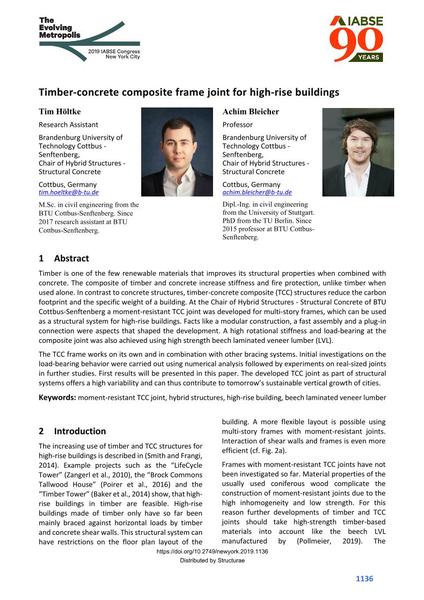Timber-concrete composite frame joint for high-rise buildings

|
|
|||||||||||
Bibliografische Angaben
| Autor(en): |
Tim Höltke
(Brandenburg University of Technology Cottbus-Senftenberg, Chair of Hybrid Structures - Structural Concrete)
Achim Bleicher (Brandenburg University of Technology Cottbus-Senftenberg, Chair of Hybrid Structures - Structural Concrete) |
||||
|---|---|---|---|---|---|
| Medium: | Tagungsbeitrag | ||||
| Sprache(n): | Englisch | ||||
| Tagung: | IABSE Congress: The Evolving Metropolis, New York, NY, USA, 4-6 September 2019 | ||||
| Veröffentlicht in: | The Evolving Metropolis | ||||
|
|||||
| Seite(n): | 1136-1140 | ||||
| Anzahl der Seiten (im PDF): | 5 | ||||
| DOI: | 10.2749/newyork.2019.1136 | ||||
| Abstrakt: |
Timber is one of the few renewable materials that improves its structural properties when combined with concrete. The composite of timber and concrete increase stiffness and fire protection, unlike timber when used alone. In contrast to concrete structures, timber-concrete composite (TCC) structures reduce the carbon footprint and the specific weight of a building. At the Chair of Hybrid Structures - Structural Concrete of BTU Cottbus-Senftenberg a moment-resistant TCC joint was developed for multi-story frames, which can be used as a structural system for high-rise buildings. Facts like a modular construction, a fast assembly and a plug-in connection were aspects that shaped the development. A high rotational stiffness and load-bearing at the composite joint was also achieved using high strength beech laminated veneer lumber (LVL). The TCC frame works on its own and in combination with other bracing systems. Initial investigations on the load-bearing behavior were carried out using numerical analysis followed by experiments on real-sized joints in further studies. First results will be presented in this paper. The developed TCC joint as part of structural systems offers a high variability and can thus contribute to tomorrow’s sustainable vertical growth of cities. |
||||
| Stichwörter: |
Hochhaus hybride Tragwerke
|
||||
